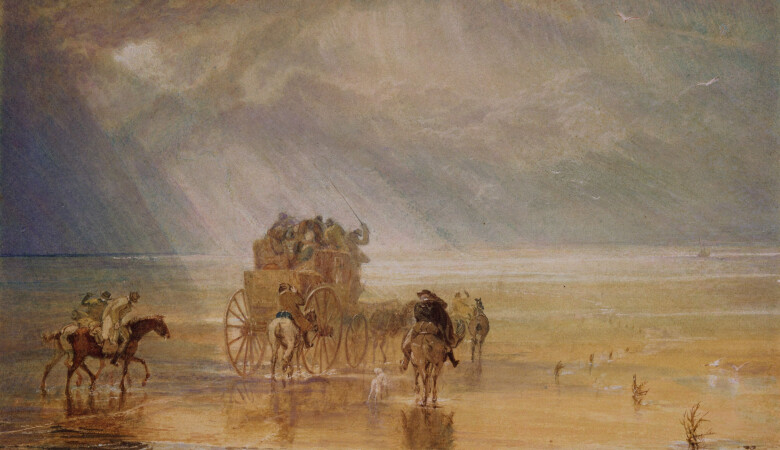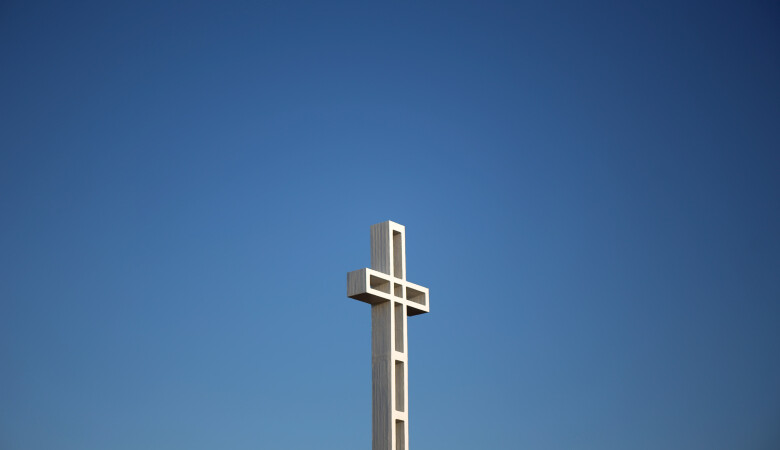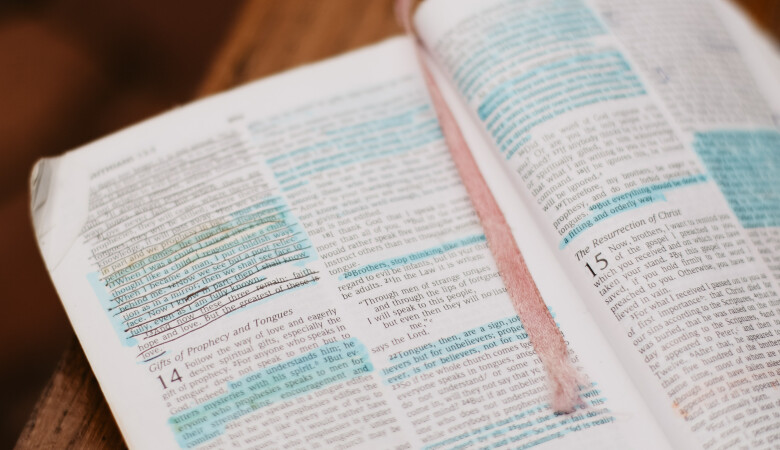The God of All the Earth Summons His People to Genuine Thankfulness
November 26, 2006 | Andy Davis
Psalms 50:1-23
Thankfulness, Justice of God
Pastor Andy Davis preaches a verse-by-verse expository sermon on Psalm 50. The main subject of the sermon is how God commands His people to be genuinely thankful for His mighty work done for them.
- SERMON TRANSCRIPT -
Thanksgiving is probably my favorite holiday, and no, it's not because it's my birthday, so thank you for those of you that sent messages encouraging me, and it was encouragement, but it's only my birthday, I guess, once every seven years. But I love Thanksgiving, and I thank God for it, because I just think that we have a tendency toward thanklessness. I just think it's our native state apart from Christ. Romans chapter 1 says, "Although they knew God, they neither glorified him as God nor gave thanks to him." And so I think we have to be shaken out of that thankless state, and so it's a blessing for us to have a day, one day in the year to give thanks to the Lord.
In December of 1620, I still marvel over it, what it must have been like to land on a beach in Cape Cod in December, not having any shelter. But the pilgrims did that and having survived their perilous Northern Passage across the Atlantic Ocean in late fall, they started too late because of some difficulties, they landed there, and it was all they could do to just sink to their knees and give thanks to God for their lives, little knowing that they're about to face the most difficult year of their lives, most difficult winter of their lives. And when that year, that winter was done, and it was difficult, as many of them died and the living had to care for the sick and dying and had to bury the dead at night for fear of Indian attack when that year was done, and God blessed them with an abundant harvest, they felt that it was right again to get down on their knees and give thanks to God and to praise him for his many blessings to them. And so Thanksgiving is rightly a part of the Christian life. We should be enriching our lives with it constantly. You know, it cuts off grumbling and complaining, when you're filling your mouth with praise and thanks for all the blessings of God. And so it is, that it is right for us to give thanks.
"Thanksgiving is rightly a part of the Christian life. We should be enriching our lives with it constantly."
Now, when we come to Psalm 50, you might think initially, it's a Psalm of Thanksgiving. In one sense it is, but in another sense it really isn't, in another sense it's a Psalm of judgment, in which God, the judge of all of the earth, calls his people to give an account and specifically addresses two problems with the people of God, the problem of formalism, and the problem of hypocrisy. What God wants is genuine thanksgiving. He wants hearts that are genuinely moved by his grace, especially to us now in the new covenant, his grace in Christ, move to give him thanks and praise. That's what he wants. He doesn't want the wheels of religion churning and turning endlessly and no heart behind it, and so he's calling his people to him for judgment so that he can deal with them and bring them to a better place, a stronger and healthier place, a place of genuine thanksgiving. Over two weeks, this week and next week, we're gonna look at the Psalm.
Next week, I'm gonna focus on just one verse in the middle, verse 15, And so I'm gonna give it light treatment today, though it is really the focal point of the whole Psalm. And the next week, I'm gonna share with you one of the greatest sermons that I've ever experienced, from one of the greatest preachers I think that ever lived. Charles Spurgeon focused on this one verse, "…call upon me in the day of trouble; I will deliver you, and you shall glorify me." But today, I'd like to look at the entire Psalm, go across it and try to understand it in its context. And it begins with the summons from the God of all the earth for judgment. We see immediately God's universal rule as King and judge and lawgiver. Look at verse one. It says, "The Mighty One, God, the LORD, speaks and summons the earth from the rising of the sun to the place where it sets."
Now, he gives us right away three titles for himself, we get the title “El”, which is just the common word for God, but it also means the one who is mighty. The mightiness of God is established in that name, and then we have “Elohim”, which is God as is the object of worship and reverence throughout the Old Testament. But then we have God's special covenant name, “Yahweh”, by which he revealed himself to Moses in the flames of the burning bush. He is the great “I Am”. And so God heaps up names upon himself here, stacking up titles as though the sovereign, the king were calling out to his realm and saying, "This is who I am and I'm summoning you to come to me for judgment."
You know, monarchs frequently will list their titles. I think we Americans we're not much on those kind of things, heraldry and titles and all of that, but they're really big in countries where there are kings and queens. And so the kings and queens, they like to accumulate titles to themselves based on things they've achieved or their ancestors have achieved, some of them are hereditary. The longest set of titles I found was for King Juan Carlos I of Spain. He had 45 of them. I will not bore you by reading all of them. I'll read some of them though. King Juan Carlos I of Spain, King of Spain, king of Castile, king of Leon, King of Aragon, King of the Two Sicilies. I didn't know there were two Sicilies, but he's king of both of them, and King of Jerusalem. I paused there. I thought, Now, that's interesting, how did Juan Carlos I get to be king of Jerusalem, but I think it was connected to a conquest by Spanish Knights during the Crusades. It struck me as obsolete, but at any rate, it's still his title.
And then I think how blessed is it that God's titles never become obsolete. Amen? And wouldn't it be wonderful? You see, He's the king, Juan Carlos, the king of Castile, because one of his ancestors conquered it, and the king of Leon, because one of his ancestors conquered and the king of Aragon, because one of his ancestors conquered it. I'm thinking, wouldn't it be great if God's title included all of our names, we who are rescued from the dominion of darkness? The King of Abraham, and Isaac and Jacob, and of Andy Davis, and of each one of you who have trusted in Christ. He is your king as well. But that would be a long time to get through his titles. So he just gives us three here at the beginning, showing his greatness, that he is worthy of worship and honor.
I. The God of All the Earth Summons His People for Judgment
And here he gives us a summons, a terrifying summons to judgment. Look at what he says, "The Mighty One, God, the LORD speaks and summons the earth from the rising of the sun to the place where it sets." He is God of all the earth, as Abraham called him before God destroyed Sodom and Gomorrah. He said, "Will not the judge of all the earth do right." He is the judge of all the earth, as in verse 4, "He summons the heavens above, and the earth, that he may judge his people." So the word summons is a sense of being called to the bar for justice. And when God gives his summons at the end of the world, it will be called Judgment Day. This is therefore a terrifying summons. We are summoned to stand trial before the judge of all the earth and to face his judgment.
Now, there are two ways to hear this summons. The first is to hear it by faith in his Word, that we read it in the Word and we believe it, that God is summoning us to come to him spiritually. And by faith, we come and we face Judgment Day early, we who are Christians, we do it at the cross, we come to the cross and we face our own sinfulness there, and we see our wickedness and the way we have transgressed God's laws. And in the cross of Christ, we find our salvation, and so we experience Judgment Day early and not fully, because Jesus is our substitute, he has downed for us, the cup of God's wrath completely and there is no condemnation for those who are in Christ Jesus. And so we come to judgment early, and we do it by faith because we believe this book, and they're not just words on the page, but actually the word of God speaking, and so we believe that God is summoning us, and we do it by faith. That's one way to hear it.
The second way won't require any faith at all. You just will need to hear him, and that will be Judgment Day, and he will call you and he will call everyone that's ever lived. And we will stand before him and give an account for our lives. And as I said, you don't need faith on that day. You will come because he will summon you. And so Jesus says in Matthew 25, "When the Son of Man comes in his glory, and all the angels with him, he will sit on his throne in heavenly glory. All the nations will be gathered before him, and he will separate the people one from another as a shepherd separates the sheep from the goats." And so that will be a summons, we all must obey, there will be no choice in the matter and no faith required. That will be a summon of the God of all the earth.
Now, I think this summons is reminiscent of Mount Sinai. There in Exodus 19, God came to his people and descended on that mountain in fire, and he caused an earthquake and a trembling, and there was a command that if anyone went up on the mountain they would be stoned to death, put to death just for going up on a mountain, and God spoke in a voice so loud that the people were terrified of it, and God created all of these emblems around the giving of the law so that the people would fear him, they would know his great power and his great holiness. And so it says in Hebrews 12:21, “The sight was so terrifying that Moses said, ‘I am trembling with fear.’” But God knows how to make us afraid, and I think we see a similar thing here. In verse 3, it says, "Our God comes and will not be silent."
Though it seems that God is silent now about our lives and our decisions and our behavior patterns, he is not silent. He speaks now in his word. He has told you what to think about everything, about how you live. So he's not silent, he speaks in his word, but some day he will speak directly to you and to me about our lives, and if we don't have Christ and if we don't have a savior, we will be condemned for sin. So God comes and he speaks and he's not silent. And he may seem silent to the unbeliever. He may seem silent to the one who has no faith, but we should know that God will bring us to judgment for all of our decisions, and that we must have Christ.
In Ecclesiastes 11:9, it says, "Be happy, young man, while you are young, and let your heart give you joy in the days of your youth. Follow the ways of your heart and whatever your eyes see, but know that for all these things God will bring you to judgment." So God will not be silent then, and he is not silent now, but we can hear him speak now, only if we believe his Word through the prophets, through the Scripture, then we can hear him speak. God comes to speak to us and he sets the stage, as I said, with awesome displays of his power, with emblems of his majesty, with manifestations of his greatness. As he did on Mount Sinai, so he does here in Psalm 50 verse 3. It says, "A fire devours before him, and around him a tempest rages." Fire, a symbol of God's purity and holiness. “[For] our ‘God is a consuming fire,’” it says in Hebrews 12:29.
Fire is a terrifying thing to us. By fire, we can lose our possessions and our property. By fire, we can lose our loved ones and our lives. How much greater the fire that burns for eternity and will never be extinguished. The fire of eternal torment, mentioned in the book of Revelation. "He too,” it says. “[The Rebel]… will drink the wine of God's fury, which has been poured full strength into the cup of his wrath. He will be tormented with burning sulfur in the presence of his holy angels and of the Lamb. And the smoke of their torment rises forever and ever. There is no rest day or night." That is a fire that rages from the justice of God. God also comes with a great storm, a tempest, a hurricane of winds, a devastation of his power.
And I've witnessed some great storms when we were missionaries in Japan. I happen to enjoy typhoon season, as long as no one got hurt and no property damage was done, and that's a big request, but many times it happened that way. And I remember spending the night at my brother-in-law's house and the wind came and it just got louder and louder and louder. They had these aluminum shutters that were used at times like that, and they were rattling, and you heard the groan and the creek of the very timbers of the house and you wondered if it would survive. And the next day we went and looked at the ocean, and there was still the effects of the typhoon was going through and it was churned into a frothy mass, and we just stood there and looked at it, and it was just so awesome, the power of God.
Notice that it says, "…around him, a tempest rages." Not within him. God is at peace all the time. He says, "Enter now into the joy of your Master." He's not storming within, but around him a tempest, rages. This is God coming to speak a word of judgment. Now, why does God do all of this? Why these emblems of fear and terror and all that. Well, I think he said it at Mount Sinai, in Exodus 20:20. Moses said to the people, "Do not be afraid. God has come to test you, so that the fear of God will be with you to keep you from sinning." That's why. So that the fear of God will keep you from sinning. And so it's a bit of a mystery, Exodus 20:20. Do not fear, because the fear of God has come. It seems to me, if you fear God, you need to fear nothing else. If you fear God, you need not fear Judgment Day or Hell or any of those things, because God has taken all of that away in Christ. If you fear God, he'll keep you from sinning. And so that's why he does it here. But notice what it says, and this is rather shocking to us, perhaps. He summons the whole world, but specifically his own people for judgment. He starts with his own people.
Look what it says in verse four and five, "He summons the heavens above, and the earth, that he may judge his people: Gather to me my consecrated ones, who made a covenant with me by sacrifice." And then again in verse seven, "Hear, O my people, and I will speak, O Israel, and I will testify against you: I am God, your God." So he's speaking to the covenant people in the Old Testament's Israel. And why does he start with his covenant people? Well, because of the perfect beauty of Zion, the centerpiece of what God is doing on earth and in history. Look at verse two, "Out of Zion, the perfection of beauty, God shines forth." Now, Zion is the dwelling place of God, but it also represents Israel, the people of God, where God will set up his dwelling place. And he means for Zion, to be pure and holy. He means for it to be clean. He wants God's radiance and glory to shine forth from Zion. In new covenant language, he wants the bride of Christ to be pure and spotless without any blemish or any such thing, but holy and beautiful, clothed in the righteousness of Christ. He wants us clean. And so he speaks concerning Zion and out of Zion, and he summons the people of God first to his courtroom for judgment. 1 Peter 4:17 says this,
"For it is time for judgment to begin with the family of God; and if it begins with us, what will the outcome be for those who do not obey the gospel of God?” And if it is hard for the righteous to be saved, what will become of the ungodly and the sinner. He starts with the people of God. That's where it begins. Now, I already mentioned how that's true of us. It starts with us, when we come to faith in Christ. We came because we felt we needed a savior, and so the judgment started with us. We have felt the judgment, the sentence of God against us, and so we have fled to the cross, but that doesn't end it there. There's ongoing trials. 1 Peter 4 is talking about trials and the sufferings of the people of God, and we must continually be purified and we must face our own weakness, and we've got enemies around us, and the judgment begins with the family of God. The purity of God's people is essential to what he's doing in this world. We must be visibly holy, not perfect, we cannot be, but we must be striving after holiness. "Blessed are those who hunger and thirst for righteousness." That hunger and thirst must be put on display. God lights a lamp and it gives light to everyone in the house, and so he wants this house to be pure, and so he's entering into judgment with his people on two sins, specifically. The sin, first of formalism, and secondly of hypocrisy.
II. God’s People Judged for Formalism
Let's look at the first one, this issue of formalism. Verse seven though13, "Hear, O my people, and I will speak, O Israel, and I will testify against you: I am God, your God. I do not rebuke you for your sacrifices or your burnt offerings, which are ever before me. I have no need of a bull from your stall or of goats from your pens, for every animal of the forest is mine, and the cattle on a thousand hills. I know every bird in the mountains, and the creatures of the field are mine. If I were hungry I would not tell you, for the world is mine, and all that is in it. Do I eat the flesh of bulls or drink the blood of goats?" And so God calls his people to judgment. And note the seriousness of the statement. God testifies against his people. Here he is their God, specifically theirs by covenant.
Now, I believe this first category of people are genuine believers, but they slipped into a kind of formalism in their relationship with God. They've fallen into the sin of formalism. Now, what do we mean by formalism? Well, friends, it's going through the forms of religion without the heart behind it, going through the forms of religiosity without the true heart of repentance and faith and love for God behind it. That is so easy for us to do. Isn't it? Well, look what he says here, verse eight, "I do not rebuke you for your sacrifices or your burnt offerings, which are ever before me." You're not lacking that. There's plenty of animals dying. Isaiah took up the steam in Isaiah one. He says, "’The multitude of your sacrifices-- what are they to me?’ says the LORD. ‘I have more than enough of burnt offerings, of rams and the fat of fattened animals; I have no pleasure in the blood of bulls and lambs and goats. When you come to appear before me, who has asked this of you, this trampling of my courts? Stop bringing meaningless offerings!’”
That's what Isaiah is talking about, meaningless offerings. It's formalism. It's going through the outward trappings of religion, and they were grossly misunderstanding God and what he truly wants. They imagined that their salvation depended on keeping the wheels, the machine of religion going.
They had misunderstood what it was all about. They imagined that God would be pleased with them and give them good crops and harvest and blessings, as long as he got his pound of flesh. If God gets his pound of flesh, then we're fine. It's like putting coins into a vending machine. You put your coins in, you get what you want out. You give God his pound of flesh, and he gives you what you're hoping for. But they never stopped to consider their ways and try to understand what the animal sacrifice was there to teach, that all sin deserves a death penalty and the death penalty can be paid by a substitute, and the substitute cannot be an animal. They must be looking ahead to something more than that. God doesn't want more and more and more animals. How much does adultery cost? One bull? It's worth it. He doesn't want that. He wants a genuine heart repentance.
Now, formalism is based on the misunderstanding of God. They failed to see the purpose of their religious deeds. All human beings tend to overestimate the value of their religious service and underestimate the significance of their sins. We all do it, don't we? "Oh, God, he has gotta be pleased with this. Now, this is something that I've done here.” And then our sins, our peccadilloes or small things, white lies, fibs. And even worse, these people forgot that God owns everything that they have and that the sacrifices they are making really are not truly sacrifices because they already belong to God. God is not a debtor, he will never be a debtor in any transaction, ever.
"These people forgot that God owns everything that they have and that the sacrifices they are making really are not truly sacrifices because they already belong to God."
He says, "I have no need of a bull from your stalls or of goats from your pens, for every animal of the forest is mine, and the cattle on a thousand hills. I know every bird in the mountains, and the creatures of the field are mine [already].” “You're not bringing me anything that's not already mine." He is not a debtor. Even more significantly, God is not needy, ever. He doesn't need anything. Verse 12, "If I were hungry, I would not tell you." I like to read it like that. It's the way Tony read it. I love it. "I wouldn't tell you, of all people." That's humbling, isn't it? Well, of all the people, would you tell me? Of all the six billion, would I be like the number one person you would tell if you were hungry? He said, "I'm not gonna ask any of you if I were hungry, for all of the world is mine and everything in it." God is not hungry and neither is he thirsty. He says, "Do I eat the flesh of bulls? Do you see me as a carnivore or a blood drinker? Because I am not."
And formalism leads to a sense of burden after a while, doesn't it? In Malachi one through 13, the prophet spoke there about the people bringing these sacrifices, one after another, and they sniff at it and they say, "What a burden!” Listen, if you're going through a formal religion, I guarantee it's gonna feel like a burden to you. It's gonna feel like a burden to do the things you do for God. If that's what you're going through, let me tell you something, let's trace it backwards. If you're feeling the burden of your religion, then you're in formalism.
Let me tell you something, God doesn't need our church attendance. God doesn't need our tithes and offerings. God does not need our evangelism. God doesn't need us to go through those Lottie Moon prayer guides. He doesn't need us to give $80,000 to the Lottie Moon Christmas offering. He doesn't need us to go as missionaries. He doesn't need us to worship Him. He doesn't need us to have our family altars or family devotion times. He doesn't need anything like that. He, frankly, doesn't need anything at all. He is the source of everything. You can't bring water to a bubbling mountain spring. What does it need with that? God doesn't need any of these things.
This is the truth that God made clear in the doxology in Romans 11, “’Who has ever given to God that God should repay Him?’ For from him and through him and to him are all things. To him be glory forever! [and ever] Amen." This is also the truth that Paul made clear to the idolaters in Athens in Acts 17. He's talking to them about their formal religion, idolatry at that point, and he said, "The God who made the world and everything in it is Lord of heaven and earth and does not live in temples built by hands. [Now listen.] And he is not served by human hands as if he needed anything, because he himself gives all men life and breath and everything else."
Imagine for a moment, and perish the very thought that God needs you to do the things you do for him. Actually, the shoe is quite on the other foot. Look at verses 14 and 15, "Sacrifice thank offerings to God, fulfill your vows to the Most High, and call upon me in the day of trouble; I will deliver you, and you will glorify [honor] me." So who is the needy one here? Is it not you? The one who needs deliverance from the day of trouble? God is calling his people here in verses 14 and15 to genuine salvation. Let's sham religion of formalism as a counterfeit. He wants genuine heart religion. He wants true sacrifices offered by faith. He doesn't want us misunderstanding his position. He doesn't want us saying, "God needs me. Isn't God fortunate to have me?" We fancy ourselves irreplaceable in the Kingdom of God. Religion is felt somehow that God needed some of their animals and what a gross lie. And so also, every mental ability, every spiritual gift, every dollar, every second, every relationship, it's all his already.
The question is: what about your heart? Have you given it to Jesus? Have you trusted in him for your salvation? And are you still trusting in him? Have you given yourself to him? And if you have given yourself, then he will accept all the sacrifices from your hands. The fact is, we are the ones in trouble and we need deliverance. And I'll talk more about that next week. But look at verse 15, "…call upon me in the day of trouble; I will deliver you, and you shall glorify me." I don't know how many different days of trouble there are in front of me right now. We'll talk about that next week, but I've gotta say something about it. You may be in a day of trouble now and you can't wait till next week. Well, God tells you here in verse 15, what to do if you're in a day of trouble. Call upon him and he will deliver you, and you will glorify him. And that will be a genuine religion at that point. That will be a genuine offering of Thanksgiving when that happens. Apart from Christ, we have no hope. But in Christ, we have full salvation, so call upon him. And Jesus Christ is the true sacrifice.
III. God Calls His People to Repentance and Faith
In the very next Psalm, Psalm 51, David knew that there was a limitation to animal sacrifice, "You do not delight in sacrifice [animals], or I would bring it…The sacrifice of God are a broken spirit; a broken and contrite heart, O God, you will not despise.” “Bring that with your sacrifice and then I'll take the animal." Yes, God commanded them to be made in the old covenant. Yes, Jesus is the fulfillment of the sacrifice in the new. But the fact has been the same across all the years. It's the heart of faith and repentance that saves, and that's what God wants from us. The fact of the matter is, God doesn't need us to serve him, but we need him to serve us.
Mark 10:45, "For even the Son of Man did not come to be served, but to serve, and to give his life as a ransom for many." The night before he was crucified, Jesus was with his disciples and noticed that their feet were dirty, and he got down on his hands and knees and he washed the feet of his disciples. “He came to Simon Peter, who said to him, ’Lord, are you going to wash my feet?’ Jesus replied, ‘You do not realize what I'm doing, but later you will understand.’ ‘No,’ said Peter, ‘You shall never wash my feet.’ Jesus answered, "Unless I wash you, you have no part with me." We must have him wash us. We must have him serve us. He must die for us, or else we cannot be with him. And so it's not that he needs us to serve him, it's that we need him to serve us.
And that's not done, by the way. We need him to continue to serve us. That was the point of the foot washing. He said, "Then wash my hands and my whole body." The person who's had a bath has already been bathed. He needs only to have his feet washed. You need to have your feet washed. And so we've got to have him continue to serve us, continue to serve us, until we are done being saved. So it is not the case that God needs us, but rather that we need God.
IV. God’s People Judged for Hypocrisy
And so we see this issue of formalism, but then we see more devastatingly, the issue of hypocrisy. And oh, that I didn't have to talk about this. Oh, that I didn't have to talk about the fact that among the so-called people of God, there are some hypocrites. Among those that assemble at the place of worship, whether old covenant or new covenant, there are some who are not genuinely converted. I wish I didn't have to talk about this. It is uncomfortable. For me, it may be one of the most uncomfortable and staggering thoughts that I could be self-deceived about my relationship with God. That it would be about me that he would say. Many will say to me on that day, "Lord, Lord, did we not prophesy in your name, and in your name drive out demons and perform many miracles." Then he will tell me, plainly, "I never knew you were away from me, you evil doer." But there are ways that we can be assured of our salvation. Scripture speaks clearly about that, yet it warns us here about hypocrisy.
Look at what it says, verses 16-21, "But to the wicked, God says: ’What right do you have to recite my laws or take my covenant on your lips? You hate my instruction and cast my words behind you. When you see a thief, you join with him; you throw in your lot with adulterous. You use your mouth for evil and harness your tongue to deceit. You speak continually against your brother and slander your own mother's son. These things you have done and I kept silent; you thought I was all together like you. But I will rebuke you and accuse you to your face.’" Here, the people take the words of God on their lips. They take the covenant of God on their lips, but their hearts are far from God. They actually hate his instruction, and they cast it behind them. You can see it by the way they live.
Three of the Ten Commandments are dealt with. Theft, adultery, false testimony, and they throw themselves in with it. They love it. It's interesting, of the three, he talks the most about the sin of the mouth. Look at verse 19 and 20, he says, "You use your mouth for evil and harness your tongue to deceit. You speak continually against your brother and slander your own mother's son." This is a habit. We are actually skillful at doing this to each other, talking about each other, slandering people, pulling them down, laying somebody low like a bombing run. And you can do it so cleverly, more than just sharing a prayer request or sharing prayer concerns. We know about that. There are more techniques and that, friends. But we can do it. I've caught myself doing it. But these folks, they love doing it. The character assassins, just like they love theft and they love adultery. A true Christian doesn't love any of these things and is deeply yearning for all of them to be gone, not just from their own heart, but from the world. And yet we struggle. Romans 7, you mentioned last time.
But these are hypocrites. These are old covenant hypocrites. Gospel hypocrites are even worse. The sin is in proportion to how much revelation you have. The more insight God has given you and you sin anyway, the worse it is for you on Judgment Day. That's what we learn from Matthew 11. And what is the end of the hypocrite? Look at verse 21, "These things you have done and I kept silent; you thought I was altogether like you. But I will rebuke you and accuse you to your face." Can you imagine having God as your accuser? I would much rather have Jesus as my savior. I'd rather have him stand and defend me against the accusations and say, “I died for that. I died for that. I died for that. I died for it all.” But to have God as your accuser, how devastating is that?
V. God Misunderstood: Both in His Position and His Person
Now we see how God is misunderstood. We've already seen it in the formalist. The formalist misunderstands God and thinks that he needs them somehow. But the hypocrite misunderstands God differently. He thinks God is like him, all together like him actually, that God actually enjoys some good adultery or theft or false testimony from time to time. God actually enjoys that kind of thing. Kind of like the Greek gods, like Zeus is kinda coming down and doing some things behind Hera's back all the time. What a bunch of losers they were. Who could ever worship those gods. I mean, they're like Hollywood stars and starlets. Brothers and sisters and friends.
God is not like that. Our God is holy. He is not altogether like us in our sin. He is unlike us and salvation is where he transforms us and makes us like him. People misunderstand the silence of God, don't they? They think because God is silent, it means God approves. Well, he doesn't approve. He has already disapproved in Scripture, and he will disapprove on Judgment Day.
VI. The Fruit of Salvation: Genuine Thankfulness
And so the hypocrite needs to be warned and not imagine that God is like him. Instead, God wants genuine thankfulness. It is the fruit of salvation. Look at verses 22 and 23. "Consider this, [he says] you who forget God, or I will tear you to pieces, with none to rescue: He who sacrifices thank offerings honors me, and he prepares the way so that I may show him the salvation of God." The animal sacrificial system prepared the way for God to show the salvation of God and Jesus. That's how it prepared the way. But the Psalmist ends here with a warning to the hypocrite who forgets God. He threatens condemnation and eternal judgment. Now, beautifully in verse 15, he has already offered deliverance from the day of trouble. What is the day of trouble? Ultimately, the Judgment Day. He has come to deliver us from it. Everyone who calls in the name of the Lord will be saved. And so he's come to deliver us from that. But here, he threatens a trouble from which none can deliver.
I wanna finish with a story from a mission trip I made in Haiti. I'll never forget this. This was incredible. I saw a young man there, a teenager who was wearing a shirt that had on it a picture Shadrach, Meshach, and Abednego in the fiery furnace. And it had some words across, I couldn't read, something like "They didn't bow, they didn't bend, they didn't burn," or something like that, I've been told. I think it's a Gospel song. I haven't heard it before, but something like that. And through a translator, I asked this young man if he knew what the story was about. He said, "No." He didn't even know it was a Bible story. It was just a shirt with a picture on it. A cool picture too, guys in the middle of fire and all that. So a group of young people gathered around and through a translator, I told them the story of Shadrach, Meshach and Abednego from Daniel chapter 3.
And I told them of evil King Nebuchadnezzar and this terrible idol that he had set up and he commanded that they fall down and worship the idol, and if they didn't, he would throw them into the fiery furnace. "…then what god will be able to rescue you from my hand?" he said. Well, he's about to get an education, isn't he? "Our God is able to deliver us from you, O king. Watch what God can do." And they were enthralled. These kids, their eyes were like saucers. They were on to it. It's a great story. It's awesome what God did. Then at the end, I wanted to talk to them about Christ. I said, "You know, there is a fire, an eternal fire on Judgment Day. And according to the scriptures, God will throw people in there. And if God puts you in that fire, then who shall be able to deliver you from God's hand?" They were totally silent, and then they all said in unison, "No one." I said, "Well, that's not entirely true. There is one who can rescue us from God's hand, and that is God. He's the only one who can do it." "…call upon me in the day of trouble; I will deliver you and you shall glorify me."
Now we come to a time of sacrifice of the Lord's table. It's not an actual sacrifice, but it's a sacrifice of praise. The Old Testament sacrificial system has been completed, but now we have an opportunity to give thanks to the Lord. That’s what the Eucharist is, the Greek word for giving thanks. You should be giving thanks to God for sending Jesus as your sacrifice. We are going to eat the bread and we're gonna drink the juice, and those are going to symbolize Jesus' body and his blood. We're going to ask the Holy Spirit to come and to infuse this time with the power and the sense of the presence of almighty God. We're gonna ask him to do that. I would like to ask that if you have not trusted in Christ as your Lord and Savior, while we are doing this, repent and trust in Christ as your Lord and Savior. Don't leave this place without having come to faith in Christ. Believe that his blood shed on the cross is sufficient for you and do not take from the Lord's supper. But if you have repented and trusted in Christ and testified to that by water baptism, you are welcome to join this table. So come now to the feast.






















